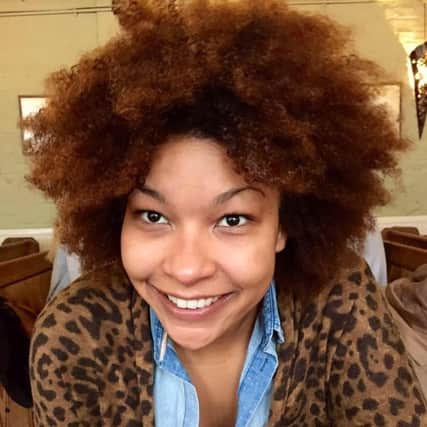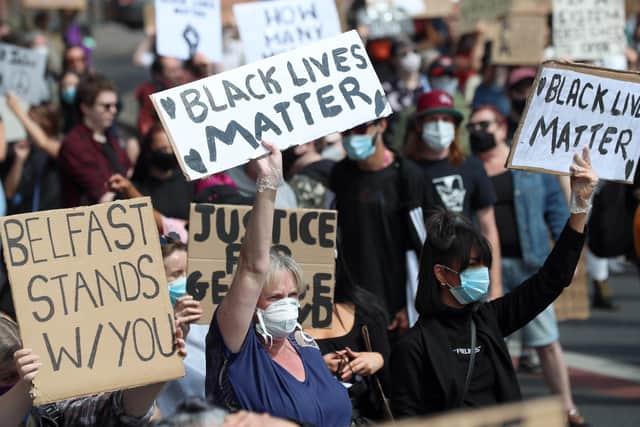‘I remember, as teenager, trying to tame my afro so I would blend in’


Cathy Kapande recalls one of the ‘‘most creative’’ insults she experienced, when ‘‘some inebriated fool shouted ‘Hey Nelson...Nelson Mandela’ ’’, as she walked past.’’
Most of the time she just laughed it off and moved on, but the 34-year-old concedes, ‘‘as the slights and slurs add up, you put up a protective shield, always waiting for the next blow. Hopeful that it won’t be more than an insult and that you won’t have to face anything physical.’’
Advertisement
Hide AdAdvertisement
Hide AdFollowing the death of her Zambian father in 1992, when she was seven years old, Cathy moved from Francistown, Botswana to Newtownards with her white Northern Irish mother and two sisters.


Looking back to that time, Cathy says: ‘‘Northern Ireland held the promise of snow and the excitement of moving in with my maternal grandparents.’’
Cathy and her sisters were promptly enrolled in Victoria Primary School, where her mother was warned that her kids might struggle as the Northern Ireland schooling system ‘‘was so good’’.
‘‘Less than a week later,’’ says Cathy, ‘‘it soon became apparent that the Botswana education system was streets ahead of Northern Ireland’s and we were all moved up a year.
Advertisement
Hide AdAdvertisement
Hide Ad‘‘I mention this as an early example of baked-in racism – the automatic assumption that everything European is more advanced and superior.
‘‘Diversity, my mum was also told, was a proud feature of the school. So, we were all a bit shocked to find that the three brown girls were definitely in the minority, with a handful of Chinese kids making up the diversity quota.’’
Cathy describes her primary school years as ‘‘largely uneventful’’.
‘‘While I knew I was different; it wasn’t an issue.’’
She and her sisters later attended Regent House Grammar School, where they all excelled.
Advertisement
Hide AdAdvertisement
Hide Ad‘‘While there still weren’t that many kids of colour around, it wasn’t altogether unsurprising. This was, after all, Newtownards,’’ she says.
‘‘We made quite the trio, three brown girls, all achieving in sport and academically. You couldn’t accuse the school of racism, we were in fact nominated as head girl, deputy head girl and finally little old me, head girl, to complete the set.’’ .
But Cathy says she could never really hide away ‘‘from being different’’.
‘‘I’ve been 6ft tall since I was 15 and if that wasn’t enough, I had, and still have, a shock of afro hair that you couldn’t miss.
Advertisement
Hide AdAdvertisement
Hide Ad‘‘But I do remember trying to tame down the afro, make myself a little less obvious and try as hard as I could to blend in.
‘‘Being a teenager isn’t easy for anyone. But being a giant, ‘black’ one makes it a little bit harder.
‘‘There were the stares when you went to play matches at other schools. The worries on nights out, when we snuck out for illicit drinking, that someone might say something offensive or racist.
‘‘I suppose, when I look back on it, my teenage years were the same as many other girls, trying to fit in, but tinged with knowing that you’d never truly fit in.’’
Advertisement
Hide AdAdvertisement
Hide AdSadly, Cathy says insults, name calling, and racial slurs were ‘‘par for the course’’ when she was growing up.
‘‘You get used to being stared at. In fact, it became so normal to me that it was only when a black friend visited from London and pointed it out that I realised that it wasn’t quite normal.’’
Cathy went on to study at Durham university and says it was probably the best thing for her ‘‘weakened self-confidence’’.
‘‘On paper and reality, the North East of England is one of the ‘whitest’ areas in the UK. I could easily count, and actually did, the number of black students and residents in this small university town.
Advertisement
Hide AdAdvertisement
Hide Ad‘‘Racism was probably more blatant here than it ever was in Northern Ireland. But I made friends with black and brown students from across the world. I learned how to speak up for myself and how to be proud of my ‘blackness’.’’
Cathy moved back to Northern Ireland in 2008 and got a job working in PR.
‘‘Again, I found myself one of the only ‘black’ people working in the industry, but in that team it didn’t matter.
‘‘I worked hard and promotions and pay rises were on merit. I know sadly this isn’t the case for many people of colour, but for me, I was always judged on my skills and my ability to get the job done.
Advertisement
Hide AdAdvertisement
Hide Ad‘‘PR is an interesting industry. Getting your face out there and networking is a vital part of the job and being one of the few, an oddity of sorts, played into my hands and was actually a benefit.
‘‘But, every time I applied for a job I worried that my name would be a barrier to getting an interview. I worried that the moment recruiters saw my name I wouldn’t even be considered for the job.
‘‘Sounds silly right? A study by experts based at the Centre for Social Investigation at Nuffield College, University of Oxford, found applicants from minority ethnic backgrounds had to send 80 per cent more applications to get a positive response from an employer than a white person of British origin.
‘‘And if you do get the job, would you be welcomed, would this be a place where you feel comfortable? Or would you constantly be on edge, worried about not being recognised for the work you put in, afraid to stand up to the thinly veiled racism that passes for ‘banter’.’’
Advertisement
Hide AdAdvertisement
Hide AdCathy left Newtownards for London in 2015 but ‘‘couldn’t quite cut ties’’ with Northern Ireland.
‘‘The irony of Northern Ireland, where green and orange seem to override everything else, was never more evident than my new job doing PR for Tourism Ireland. I secured an interview because of my PR skills, but got the job because I ticked the Protestant Northerner box!
‘‘Green or orange permeates every aspect of Northern Ireland. I hope it has changed since I left, but for me growing up and working there, it seemed to override even white and black.
‘‘We joke, “are you a Protestant black or a Catholic black?” Northern Ireland doesn’t quite know what to do with brown folk.
Advertisement
Hide AdAdvertisement
Hide AdAre they scary? Are they exotic? Why would they come here? What are they doing here? Are they taking our jobs?
‘‘And when we do acknowledge that there are black people here, we talk of welcoming them with open arms and that we don’t see colour and there is no problem with racism in Northern Ireland.
‘‘But we want you to see our colour. When you tell us that you don’t see our colour you are trying to compliment us, but in fact you are saying that society has told you that black is bad and we are one of the ‘good blacks’.
‘‘We want you to see that we are black and celebrate our culture as you do your own and recognise that you carry bias with you that leads to black and brown people being insulted, discriminated against and made to feel less.’’
Advertisement
Hide AdAdvertisement
Hide AdCathy, who now works in England for retailer John Lewis, believes no conversation about attitudes to black people ‘‘can ignore Britain’s colonial history.’’
‘‘The real history of Empire, warts and all isn’t taught. So, we venerate slave owners for their philanthropy and mistreat the Windrush Generation as second class citizens because of the colour of their skin.
‘‘Immigrants are still demonised, and those that came from former colonies belittled and placed at the bottom of the pyramid and characterised as a burden on society. This is despite the fact that these people often represented the best and brightest of their country, were well educated and vastly over-qualified for the only jobs the UK would deign to give them.’’
In the weeks since the death of African-American man George Floyd’ at the hands of the police in Minneapolis,the world has witnessed some of the most engaged, passionate and determined anti-racism protests and calls-to-action in recent memory. Across the world, thousands of protesters have taken to the streets and social media to show solidarity with the Black Lives Matter movement and demand governments actively put an end to police brutality and institutional racism.
Advertisement
Hide AdAdvertisement
Hide AdCommenting on those events, Cathy says: ‘‘I am proud of my black heritage and most of the time I am comfortable in my own skin.
‘‘But the events in America were a stark reminder to me, and to many people of colour, that we are not always welcome and we will often be treated differently.
‘‘Some people might ask why are we focusing on #BlackLivesMatter, don’t all lives matter? Look at it this way…. If a house on your street was on fire, would you expect the fire brigades to arrive and focus their hoses on all the houses? Of course not.
‘‘While they would, rightly, argue that all homes matter, in that very moment they’ll focus their attention and expertise on the house that’s burning down.
Advertisement
Hide AdAdvertisement
Hide Ad‘‘And for me, as a black person, the protests and the conversations are both difficult to deal with and welcome because they are a long time coming.
‘‘And the focus on black lives is because it has become so apparent that black people are facing monumental challenges that stop them from simply living their lives free from racism and discrimination.
She adds: ‘‘Racism is (ironically) not black or white. We have, in the most part moved on from wearing white capes and calling black people offensive names. ‘‘The racism we must confront and break down today is much harder because for most white people it isn’t overtly visible. It just happens unnoticed because that’s the way it’s always been.’’
A message from the Editor:
Thank you for reading this story on our website. While I have your attention, I also have an important request to make of you.
Advertisement
Hide AdAdvertisement
Hide AdWith the coronavirus lockdown having a major impact on many of our advertisers - and consequently the revenue we receive - we are more reliant than ever on you taking out a digital subscription.
Subscribe to newsletter.co.uk and enjoy unlimited access to the best Northern Ireland and UK news and information online and on our app. With a digital subscription, you can read more than 5 articles, see fewer ads, enjoy faster load times, and get access to exclusive newsletters and content. Visit https://www.newsletter.co.uk/subscriptions now to sign up.
Our journalism costs money and we rely on advertising, print and digital revenues to help to support them. By supporting us, we are able to support you in providing trusted, fact-checked content for this website.
Alistair Bushe
Editor